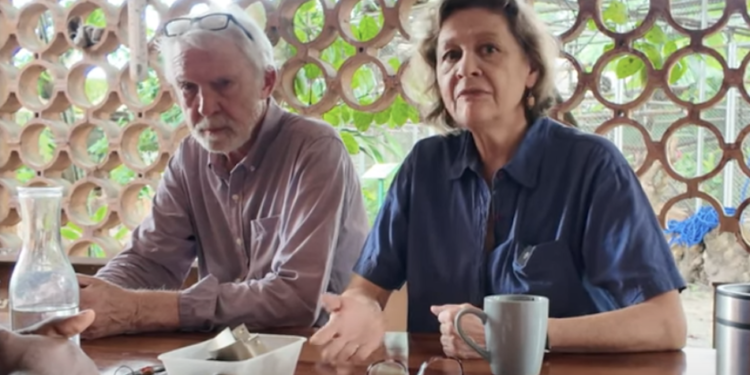Two American tourists, Liza Gatsby and Peter Jenkins, recently shared their extraordinary journey of spending over 36 years in Nigeria, despite initially arriving in the country with only a 10-day transit visa. In an interview with content creator David Nkwa, which was monitored by our correspondent on Wednesday, the pair recounted how they unexpectedly fell in love with Nigeria and decided to stay indefinitely.
The couple explained that their initial plans did not include an extended stay, but they quickly became captivated by Nigeria’s opportunities in Science and Wildlife Conservation, as well as the hospitality and vibrant living conditions that, at the time, seemed better than in America.
“I’ll tell you what I like about Nigerians,” Gatsby said. “That’s what makes Nigeria different from every other country in Africa. They would say ‘hey! Oyinbo, come in na, sit down, make we talk. Make I go buy you drink.’ That is the difference between Nigeria and the rest of Africa.”
The couple was particularly drawn to the plight of the endangered drill monkeys, which led them to establish a nonprofit organization called Pandrillus, dedicated to the conservation of these rare primates in Calabar and Bano, Cross River State. Gatsby emphasized the importance of preserving all species, noting that drills are one of the rarest animals in Africa.
Jenkins explained that their decision to settle in Calabar was strategic. After conducting research, they discovered that aside from Cameroon, Calabar was one of the few places where drill monkeys could be found. They collaborated with local communities to conserve these rare species, making the area habitable for wildlife while conducting their research.
Reflecting on their time in Nigeria, Jenkins expressed his love for the country, recalling how affordable and hospitable life was in the late ’80s and early ’90s. “When we got here, the population of Nigeria was around 65 million, and the amount of natural resources that were still intact was extraordinary. The density of wildlife in the forests was remarkable compared to today,” he said. Jenkins fondly remembered how affordable basic necessities were, making Nigeria an ideal place for research and living.
However, Gatsby pointed out a significant challenge facing Nigeria today: a lack of patriotism and appreciation for the country’s cultural heritage, natural resources, and traditional knowledge. She lamented the growing neglect of Nigeria’s rich cultural identity, including traditional herbs and healing practices, which she fears could be lost if not preserved.
“Nigerians don’t have pride in Nigeria’s natural heritage. I think that’s a big issue because that’s what it takes to try to make a difference,” she remarked. Gatsby expressed concern over the loss of traditional knowledge, particularly in herbal medicine, as older generations pass without apprentices to carry on their knowledge.
She questioned the reliance on imported herbal remedies, asking, “What’s wrong with our traditional ones here?” Gatsby’s reflections highlighted the need for Nigerians to reclaim and preserve their cultural and natural heritage.
























